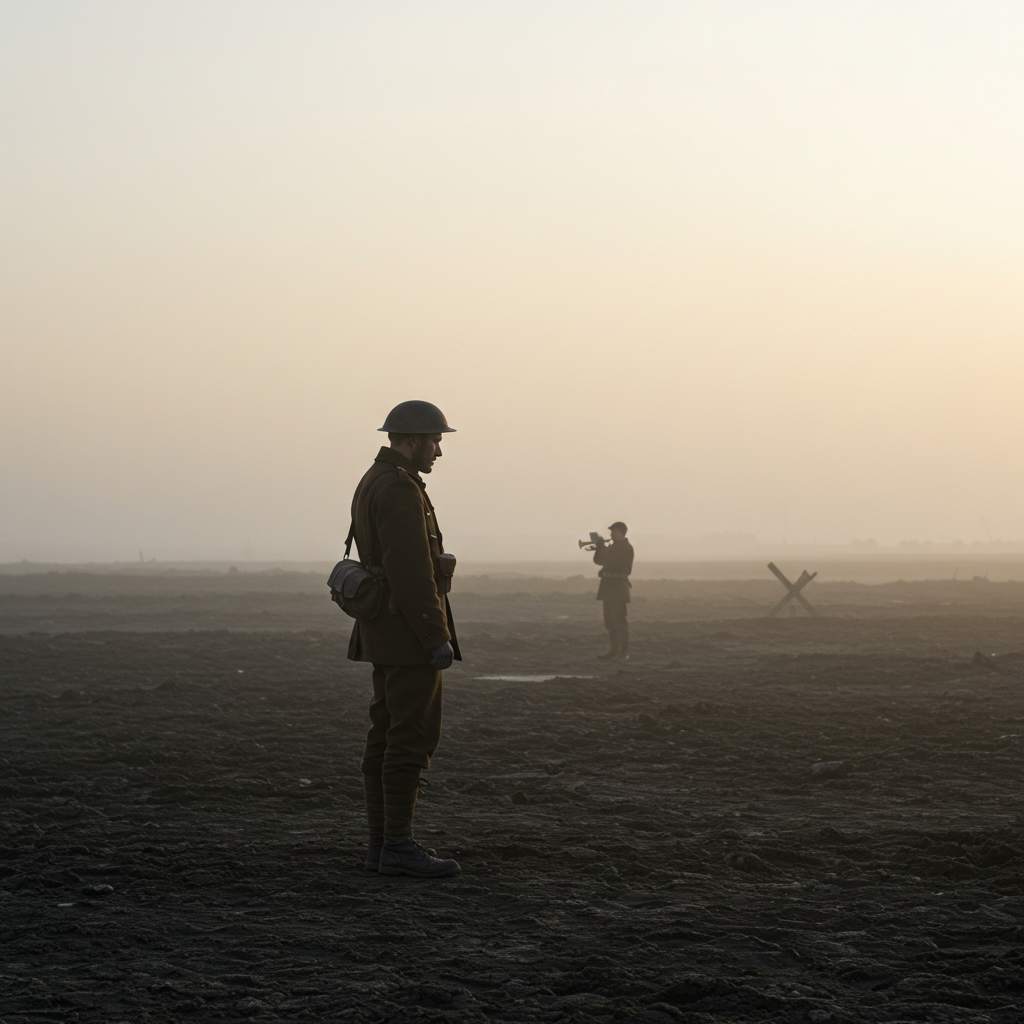No one cares less than I
Edward Thomas
1878 to 1917

Want to track your favorites? Reopen or create a unique username. No personal details are required!
"No one cares less than I,
Nobody knows but God,
Whether I am destined to lie
Under a foreign clod,"
Were the words I made to the bugle call in the morning.
But laughing, storming, scorning,
Only the bugles know
What the bugles say in the morning,
And they do not care, when they blow
The call that I heard and made words to early this morning.
Edward Thomas's No one cares less than I
Edward Thomas’s “No one cares less than I” distills the existential futility of war into a haunting dialogue between a soldier’s introspection and the indifferent machinery of conflict. Written during World War I, the poem reflects Thomas’s acute awareness of mortality and the dissonance between individual agency and the impersonal forces of war. While avoiding overt descriptions of battlefield horror, it captures the psychological erosion of soldiers through stark imagery and paradoxical resignation.
Historical and Cultural Context
The poem emerges from the confluence of Thomas’s personal struggles and the broader cultural dislocations of World War I. Enlisting in 1915 amid intense personal conflict-torn between Frost’s urging to emigrate and a guilt-ridden sense of duty-Thomas transformed his ambivalence into verse that critiques nationalism while acknowledging war’s inevitability 45. The bugle call, a daily military ritual, becomes a metaphor for the dehumanizing rhythms of war, stripping soldiers of autonomy.
Thomas’s work often grapples with “knowable communities” destabilized by modernity and conflict 2. Here, the “foreign clod” symbolizes not just physical displacement but the severing of ties to the English countryside that defined his earlier poetry. The poem’s focus on existential isolation reflects the era’s broader crisis of meaning, as traditional ideals collided with industrialized slaughter.
Literary Devices and Structure
Paradox and Personification
The opening lines-“No one cares less than I, / Nobody knows but God”-establish a paradox: the speaker’s proclaimed indifference masks profound existential anxiety. This contradiction mirrors Thomas’s own enlistment, driven less by patriotism than a fatalistic urge to resolve his inner turmoil 410. The bugles, personified as “laughing, storming, scorning,” embody war’s capricious authority, their mockery underscoring the soldier’s powerlessness.
Imagery and Symbolism
The “foreign clod” evokes both the anonymity of mass graves and the alienation of dying far from home-a theme Thomas revisits in “The Cherry Trees” 8. Morning, typically symbolic of renewal, becomes a time of dread, its cyclical return mirroring the relentless repetition of war. The bugle’s call, stripped of heroism, reduces the soldier to a passive recipient of fate.
Dialogic Structure
The poem’s two stanzas form a dissonant dialogue:
-
First stanza: The soldier’s internal monologue, grappling with mortality.
-
Second stanza: The bugles’ response, indifferent and mocking.
This structure mirrors the conflict between individual conscience and institutionalized violence, a tension central to Thomas’s broader critique of war 36.
Themes
Existential Isolation
The poem’s refrain-“Nobody knows but God”-highlights the solitude of confronting mortality. Yet this theological nod is undercut by the bugles’ scorn, suggesting divine absence. Thomas, who described war as “the parochialism of humanity” 2, frames the soldier’s fate as both intimate and absurd, a private struggle rendered meaningless by war’s scale.
The Illusion of Agency
The speaker’s claim to indifference (“No one cares less than I”) is a defensive posture, masking his lack of control. Thomas, who felt compelled to enlist despite skepticism toward jingoism 2, mirrors this paradox. The bugles’ dominance-“Only the bugles know / What the bugles say”-reduces the soldier to a cipher, his self-authored words (“The words I made”) rendered futile against institutional authority.
Nature’s Indifference
Unlike Thomas’s pastoral poems, where nature offers solace, here it is complicit in war’s cruelty. The morning bugle call perverts natural cycles into instruments of oppression, reflecting modernity’s disruption of rural harmony-a theme Thomas explores in “Lob” 210.
Comparative Analysis
With Thomas’s Other Works
-
“Rain”: Both poems use weather to mirror psychological states, but “Rain” seeks communion with the dead (“Like a cold water among broken reeds”), while this poem confronts existential abandonment.
-
“The Sun Used to Shine”: Recalls pre-war walks with Frost, contrasting pastoral tranquility with war’s intrusion-a tension absent here, where nature is already corrupted 5.
With War Poets
-
Wilfred Owen: Owen’s “Anthem for Doomed Youth” uses auditory imagery (bugles, choirs) to lament lost lives, whereas Thomas’s bugles symbolize impersonal authority.
-
Siegfried Sassoon: Sassoon’s satire attacks specific injustices; Thomas’s critique is philosophical, probing war’s erosion of meaning.
Biographical and Philosophical Insights
Thomas’s decision to enlist-spurred partly by Frost’s “The Road Not Taken”, which he misinterpreted as a rebuke for indecision 45-infuses the poem with autobiographical resonance. His letters reveal a man torn between duty and despair, embodying the poem’s tension between action and futility 610.
Philosophically, the poem aligns with Albert Camus’s absurdism: the soldier’s search for meaning in a universe indifferent to his fate. The closing lines-“they do not care, when they blow”-echo Camus’s assertion that “the absurd is born of this confrontation between the human need and the unreasonable silence of the world.”
Emotional Impact
The poem’s power lies in its restraint. Unlike graphic trench poetry, it conveys horror through psychological precision: the speaker’s feigned apathy, the bugles’ malevolent agency, and the void where solace should reside. Readers confront not just war’s brutality but its existential vacuum-the erosion of selfhood in the face of inexorable systems.
Conclusion
“No one cares less than I” encapsulates Thomas’s unique voice in WWI poetry: unflinching yet understated, personal yet universal. By intertwining the soldier’s intimate dread with war’s impersonal machinery, he exposes the conflict’s deepest wound-the collapse of individual meaning. The poem endures as a testament to Thomas’s ability to distill vast historical forces into moments of piercing human truth, affirming poetry’s capacity to grapple with the ineffable.
This text was generated by AI and is for reference only. Learn more

